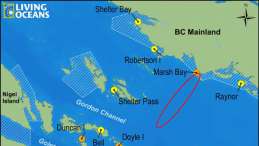‘Gold Standard’ Certification Scheme Tarnished by Marine Mammal Deaths and More
North America’s first Aquaculture Stewardship Council -certified salmon farm raises questions of credibility
FOR IMMEDIATE RELEASE: 8 December, 2016
VANCOUVER: Today Living Oceans filed a formal complaint regarding Marine Harvest Canada’s Marsh Bay salmon farm, whose Aquaculture Stewardship Council (ASC) certification had been suspended over the drowning deaths of seven marine mammals. The suspension appears to have been lifted without adequate public explanation of the steps taken to protect marine mammals such as whales and sea lions from becoming entangled in the farm’s nets.
The issue is brought more sharply into focus by two recent reports of Humpback whale entanglements in other Marine Harvest farms. As the northern population of Humpback whales rebounds, the risk of future entanglements and deaths increases.
The farm is currently harvesting fish for market with the ASC’s “farmed responsibly” logo. This is deeply concerning as the farm and its cohort of fish have been linked in the complaint to a number of unsustainable farming practices that breach the ASC standards, including the sea lion drownings.
This is the second time Marsh Bay fish are going to market with the ASC logo despite a complaint of breach of the standards. Living Oceans filed a formal complaint in May 2015, when the first four of the eventual seven sea lion drownings occurred. No immediate action was taken by the auditor responsible until well after the farm had sold its fish at the premium prices attracted by ASC-certification.
The farm’s certification was finally suspended after an audit in November of 2015, pending evidence that effective measures were in place to prevent marine mammal deaths. However, that suspension was lifted in October, in time for harvest. No information on what the farm did to correct the problem has been made public.
Living Oceans’ latest complaint alleges the suspension process did not follow the ASC requirements. The Marsh Bay certificate should have been withdrawn altogether, the complaint says, not only because of the drownings but because the farm also had dangerously high sea lice levels and employed more chemical treatments than the allowable limit set by the ASC.
“This is a farm that should never have been certified in the first place. Had the initial audit been conducted according to the rules, the seven sea lion deaths would have disentitled Marsh Bay to certification. The audit process then failed a second time, when following the drownings, no swift action was taken to suspend the farm, allowing the fish to go to market with a misleading logo,” stated Kelly Roebuck, Sustainable Seafood Campaigner at Living Oceans. “Now we are seeing the audit process fail the customer for a third time, as yet another Marsh Bay fish harvest enters the market with the ASC tick of approval,” continued Roebuck.
Marsh Bay is one of twelve B.C. salmon farms currently ASC certified. All three major B.C. salmon farming companies have publicly committed to obtaining 100% ASC certification by 2020. “With such industry pressure and urgency to seek ASC certification, it is critical to ensure the audit process and the standard itself are not being compromised,” concluded Karen Wristen, Executive Director of Living Oceans Society.
-30-
Contact Information
Karen Wristen 604-788-5634

